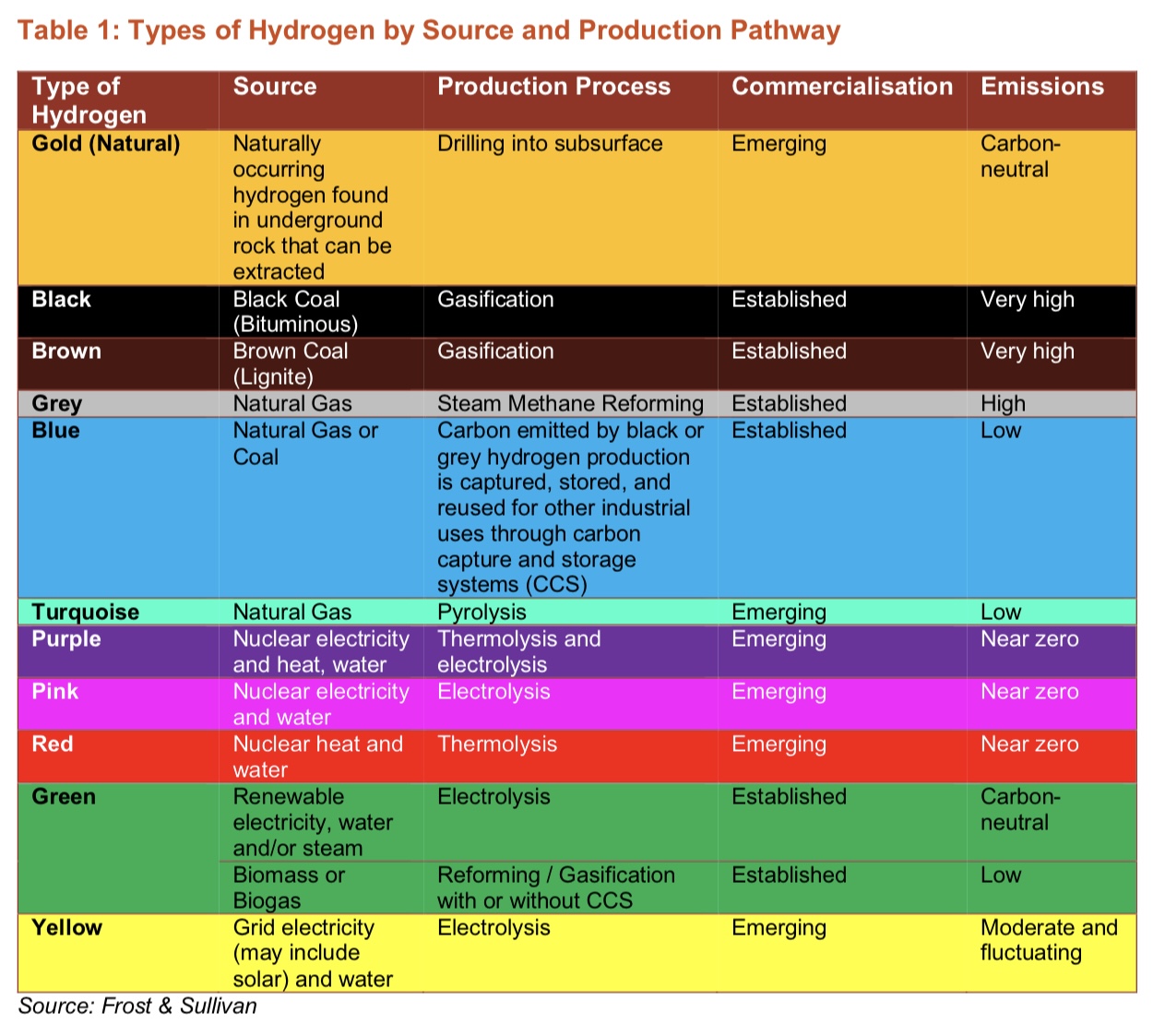Gold or White Hydrogen is natural occurring hydrogen that can be extracted from underground rock. Natural Hydrogen can be continuously generated in the Earth’s crust through a variety of chemical reaction pathways such as oxidation and radiolysis. Natural Hydrogen has been found in other locations globally including Russia, USA and Brazil. Previously naturally occurring or geological hydrogen has largely overlooked because it was assumed rare or too difficult to extract. Summary of the types of Hydrogen below from Gold Hydrogen Prospectus.
 Only current example I can find of natural Hydrogen being used is in Bourakebougou, Mali. Where in 2015, natural hydrogen company Hydroma came across Gold Hydrogen by chance whilst drilling for water. Analysis of the well showed Hydrogen gas had a concentration of 98% pure H2. The size of the hydrogen field is estimated to be 8km in diameter and now provides electricity to the local village. Scientist believe gas generation will continue for thousands of years.
Only current example I can find of natural Hydrogen being used is in Bourakebougou, Mali. Where in 2015, natural hydrogen company Hydroma came across Gold Hydrogen by chance whilst drilling for water. Analysis of the well showed Hydrogen gas had a concentration of 98% pure H2. The size of the hydrogen field is estimated to be 8km in diameter and now provides electricity to the local village. Scientist believe gas generation will continue for thousands of years.
From my research there a few start-ups/companies investigating the possibility of turning old depleted oil wells into a source of potential hydrogen source. Cemvita Factory, a biotech firm is experimenting with introducing bacteria and nutrients to old oil wells to produce Hydrogen, can read further here https://www.wired.co.uk/article/gold-hydrogen
The case for Hydrogen and its benefits can be read about in this report “The Future of Hydrogen” prepared by the IEA for the G20 in 2019 https://iea.blob.core.windows.net/assets/9e3a3493-b9a6-4b7d-b499-7ca48e357561/The_Future_of_Hydrogen.pdf
Brief Summary Case for Hydrogen
Hydrogen can help tackle various critical energy challenges. It offers way to decarbonise a range of sectors including long haul transport, chemicals, and iron and steel. Hydrogen can be produced in a wide variety of ways including renewables, nuclear, natural gas, coal and oil. It can be transported as a gas by pipelines or in liquid form by ships, much like LNG. It can be transformed into electricity and methane to power homes and feed industry, and into fuels for cars, trucks, ships and planes. The Soviets made the world’s first hydrogen powered airline in 1988 with its experimental work using at Tupolev TU-155, can read further here for those interested http://blog.privatejetfinder.com/tu-155-hydrogen/
Brief Bear Case for Hydrogen
Producing Hydrogen from low-carbon energy is costly at the moment. The development of hydrogen infrastructure the likes of Fuel cells, refuelling equipment and electrolysers (which produce hydrogen from electricity and water) is slow and holding back widespread adoption. Hydrogen is almost entirely supplied from natural gas and coal today.

 Only current example I can find of natural Hydrogen being used is in Bourakebougou, Mali. Where in 2015, natural hydrogen company Hydroma came across Gold Hydrogen by chance whilst drilling for water. Analysis of the well showed Hydrogen gas had a concentration of 98% pure H2. The size of the hydrogen field is estimated to be 8km in diameter and now provides electricity to the local village. Scientist believe gas generation will continue for thousands of years.
Only current example I can find of natural Hydrogen being used is in Bourakebougou, Mali. Where in 2015, natural hydrogen company Hydroma came across Gold Hydrogen by chance whilst drilling for water. Analysis of the well showed Hydrogen gas had a concentration of 98% pure H2. The size of the hydrogen field is estimated to be 8km in diameter and now provides electricity to the local village. Scientist believe gas generation will continue for thousands of years.